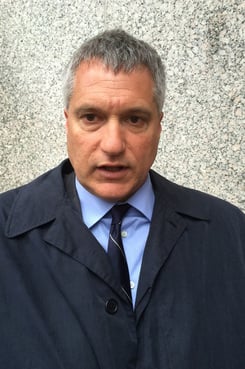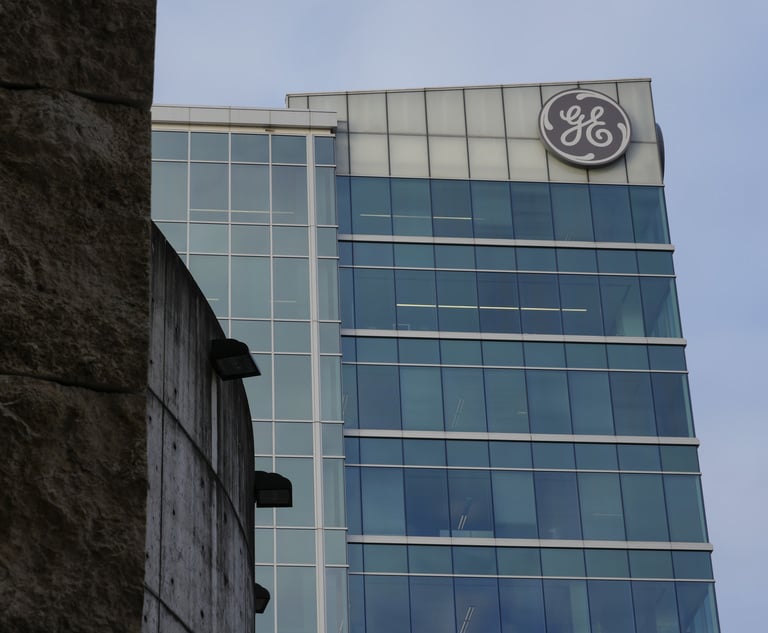Donziger Says Seward & Kissel May Have Chevron-Related Conflicts
The suspended lawyer, who is being prosecuted by a team of Seward & Kissel lawyers, has said business connections between the firm, its clients and Chevron call their impartiality into question.
January 03, 2020 at 03:15 PM
4 minute read
 Steven Donziger, talking to press outside the courthouse in 2015. NYLJ/Mark Hamblett
Steven Donziger, talking to press outside the courthouse in 2015. NYLJ/Mark Hamblett
This story has been updated with Seward & Kissel's response Friday.
Steven Donziger, the suspended lawyer who is facing criminal contempt charges stemming from his long fight with Chevron over environmental contamination in Ecuador, has asked a federal judge to force court-appointed prosecutors at Seward & Kissel to disclose any ties their firm has to the oil giant.
Seward & Kissel lawyers Rita Glavin, Brian Maloney and Sareen Armani were appointed last August to prosecute Donziger for criminal contempt for allegedly flouting a discovery order in a lawsuit brought by Chevron. The U.S. Attorney's Office in the Southern District of New York declined to take up the criminal contempt case, leading to the unusual appointment of private prosecutors for a public prosecution.
In a Tuesday letter to U.S. District Judge Loretta Preska of the Southern District of New York, Donziger's lawyer, Andrew Frisch, said his research led him to believe that an unnamed Seward & Kissel partner served on Chevron's board and that the firm served clients who do business with Chevron or related entities. He said Glavin "has declined to answer my questions about Seward's ties to Chevron."
It wasn't clear Friday which people or entities Frisch was referring to. But one area of overlap between Chevron and Seward & Kissel is the shipping industry. Few law firms have maritime law practices that are as robust as Seward & Kissel's, and Chevron's oil and liquified natural gas are transported globally on ships.
Another possible overlap is Oaktree Capital Management. Frisch's letter referred to a Chevron board member who is the vice-chairman of an investment fund that has funded at least two of Seward & Kissel's clients. Chevron director John Frank is Oaktree's vice chairman, and Oaktree is listed as an investor on at least two deals listed on Seward & Kissel's website.
In a response filed later Friday, Glavin said it was simply not true that any Seward partner had been on Chevron's board. As to the allegation that its clients had done business with Chevron, she wrote, "even if true, this creates no conflict or conflicting loyalty for the prosecution team in this criminal case."
"Prior to taking on this representation, Seward performed appropriate conflict checks (as it does before taking on any representation)," she wrote. She said the case law cited by Donziger didn't apply.
Frisch's letter Tuesday also called for Glavin and her colleagues to disclose any communications they have had with the chambers of U.S. District Judge Lewis Kaplan of the Southern District of New York, who appointed them to prosecute Donziger. Frisch said it was "it is important to clarify whether and the extent to which" the judge has played a role in the prosecution.
In response to Donziger's question about contacts with Judge Kaplan, Glavin wrote, "the prosecution does not work for Judge Kaplan and makes its own decisions in this case."
Glavin and Frisch declined to comment.
The letters come as Donziger facing legal threats on three fronts. The suspended attorney, who has been subject to home confinement for several months, won a $9 billion judgment against Chevron in Ecuador's courts in 2011, but Chevron successfully argued in U.S. courts that the judgment was obtained through bribery. The oil giant, in turn, won an $800,000 judgment against Donziger and has tried to enforce it and to have him disbarred.
While the criminal contempt case advances, Donziger has sought to partly pause the civil case brought by Chevron, which is seeking to enforce its judgment. He appealed a Dec. 9 decision by Kaplan rejecting his motion in that case. He has also asked the U.S. Court of Appeals for the Second Circuit to reverse a decision by Preska to keep him subject to home confinement.
In the meantime, potential disbarment proceedings have been ongoing in New York state courts. Referee John Horan heard several days of testimony in October and posttrial briefs were filed in December.
This content has been archived. It is available through our partners, LexisNexis® and Bloomberg Law.
To view this content, please continue to their sites.
Not a Lexis Subscriber?
Subscribe Now
Not a Bloomberg Law Subscriber?
Subscribe Now
NOT FOR REPRINT
© 2025 ALM Global, LLC, All Rights Reserved. Request academic re-use from www.copyright.com. All other uses, submit a request to [email protected]. For more information visit Asset & Logo Licensing.
You Might Like
View All
Oil Co. Alleges Plot to Drive Away Competition in NYC's Liquid Fuel Market
3 minute read

GE Agrees to $362.5M Deal to End Shareholder Claims Over Power, Insurance Risks
2 minute read
Lukoil Pan Americas Sues Investment Firm Over Alleged $18 Million Breach
Trending Stories
- 1Contract Technology Provider LegalOn Launches AI-powered Playbook Tool
- 2Court of Appeals Provides Comfort to Land Use Litigants Through the Relation Back Doctrine
- 3Amid the Tragedy of the L.A. Fires, a Lesson on the Value of Good Neighbors
- 4Democracy in Focus: New York State Court of Appeals Year in Review
- 5In Vape Case, A Debate Over Forum Shopping
Who Got The Work
J. Brugh Lower of Gibbons has entered an appearance for industrial equipment supplier Devco Corporation in a pending trademark infringement lawsuit. The suit, accusing the defendant of selling knock-off Graco products, was filed Dec. 18 in New Jersey District Court by Rivkin Radler on behalf of Graco Inc. and Graco Minnesota. The case, assigned to U.S. District Judge Zahid N. Quraishi, is 3:24-cv-11294, Graco Inc. et al v. Devco Corporation.
Who Got The Work
Rebecca Maller-Stein and Kent A. Yalowitz of Arnold & Porter Kaye Scholer have entered their appearances for Hanaco Venture Capital and its executives, Lior Prosor and David Frankel, in a pending securities lawsuit. The action, filed on Dec. 24 in New York Southern District Court by Zell, Aron & Co. on behalf of Goldeneye Advisors, accuses the defendants of negligently and fraudulently managing the plaintiff's $1 million investment. The case, assigned to U.S. District Judge Vernon S. Broderick, is 1:24-cv-09918, Goldeneye Advisors, LLC v. Hanaco Venture Capital, Ltd. et al.
Who Got The Work
Attorneys from A&O Shearman has stepped in as defense counsel for Toronto-Dominion Bank and other defendants in a pending securities class action. The suit, filed Dec. 11 in New York Southern District Court by Bleichmar Fonti & Auld, accuses the defendants of concealing the bank's 'pervasive' deficiencies in regards to its compliance with the Bank Secrecy Act and the quality of its anti-money laundering controls. The case, assigned to U.S. District Judge Arun Subramanian, is 1:24-cv-09445, Gonzalez v. The Toronto-Dominion Bank et al.
Who Got The Work
Crown Castle International, a Pennsylvania company providing shared communications infrastructure, has turned to Luke D. Wolf of Gordon Rees Scully Mansukhani to fend off a pending breach-of-contract lawsuit. The court action, filed Nov. 25 in Michigan Eastern District Court by Hooper Hathaway PC on behalf of The Town Residences LLC, accuses Crown Castle of failing to transfer approximately $30,000 in utility payments from T-Mobile in breach of a roof-top lease and assignment agreement. The case, assigned to U.S. District Judge Susan K. Declercq, is 2:24-cv-13131, The Town Residences LLC v. T-Mobile US, Inc. et al.
Who Got The Work
Wilfred P. Coronato and Daniel M. Schwartz of McCarter & English have stepped in as defense counsel to Electrolux Home Products Inc. in a pending product liability lawsuit. The court action, filed Nov. 26 in New York Eastern District Court by Poulos Lopiccolo PC and Nagel Rice LLP on behalf of David Stern, alleges that the defendant's refrigerators’ drawers and shelving repeatedly break and fall apart within months after purchase. The case, assigned to U.S. District Judge Joan M. Azrack, is 2:24-cv-08204, Stern v. Electrolux Home Products, Inc.
Featured Firms
Law Offices of Gary Martin Hays & Associates, P.C.
(470) 294-1674
Law Offices of Mark E. Salomone
(857) 444-6468
Smith & Hassler
(713) 739-1250






